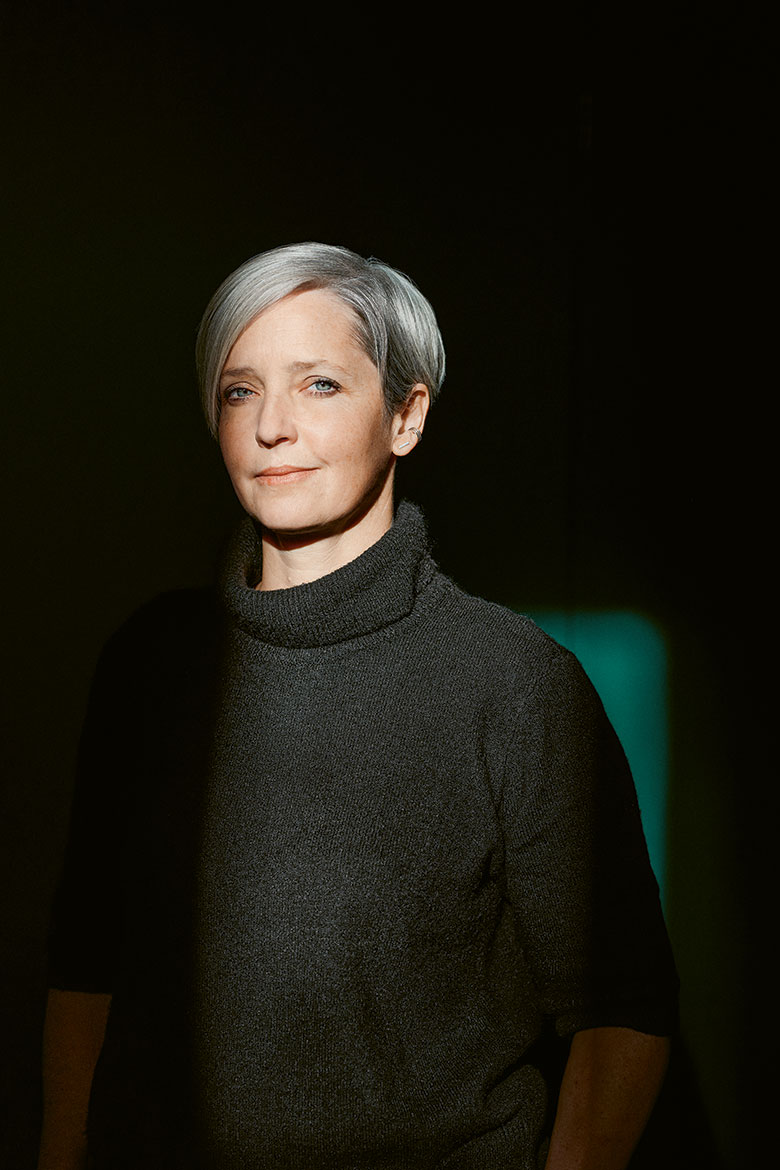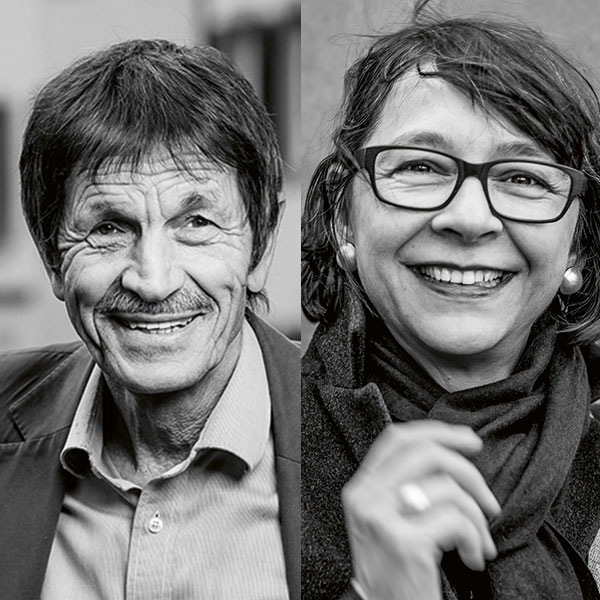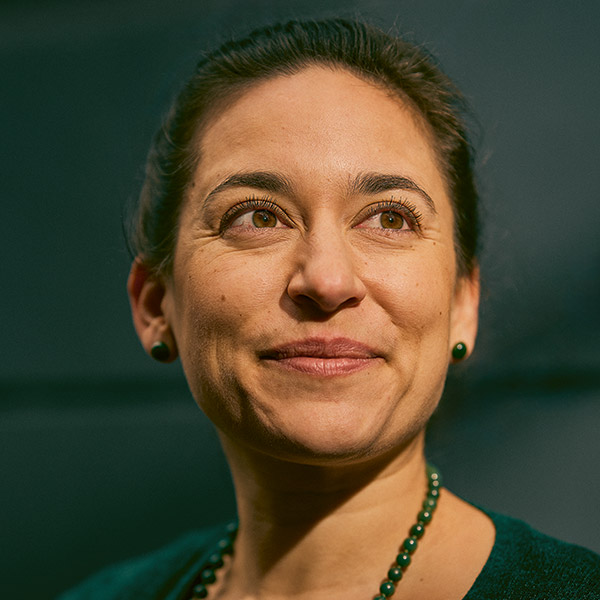PORTRAIT
Shedding light on the dark history of welfare
Switzerland’s former welfare policies did significant harm to marginalised groups. The historian Loretta Seglias has been investigating this topic for the past 20 years. She tells us about emotional encounters and big responsibilities.

She sees herself as merely one cog in the machinery that is helping us to come to terms with the past. But the research conducted by historian Loretta Seglias has finally provided official proof of the suffering of many people. | Image: Ladina Bischof
“On behalf of the Swiss government, I ask you to accept my sincere, wholehearted apologies for the suffering that was inflicted on you”. These historic words were spoken by Federal Councillor Simonetta Sommaruga in 2013 at an event commemorating former indentured children and victims of coercive welfare measures. But getting to this point had been a long process for everyone involved – the victims, the politicians and the academics. One of them was the historian Loretta Seglias, who recalls her feelings at the time: “Now something was really happening. We were in a very different place from ten years before”.
In the early 2000s, when the Swiss National Council passed its initial motions in favour of investigating issues from recent history such as compulsory sterilisations, Seglias was already placing her knowledge at the disposal of the politicians. “But I had no political mandate. And to this day, quite intentionally, I’m not a card-carrying member of any political party”. At first, hardly anyone took any notice. But ten years later, there was a huge wave of interest in the media, and the realisation of what had happened had a huge impact on politics and society as a whole. Until the 1980s, people who did not conform to the social norms in Switzerland were stigmatised and locked away, and their children were placed in care.
From pioneer to expert
Once this topic began attracting more attention, it also brought increased recognition for those who had done the pioneering work in the field. These included Seglias (see the information box). As a member of the Independent Expert Commission (IEC) on Administrative Detention, she subsequently made a major contribution to rehabilitating the victims. She puts it this way: “I was just a single cog in the machine. A lot of people were involved, and historical research as a whole played an important role”. In general, the politicians and media cooperated well with the IEC. “There were moments when I wished my dialogue partners had read up more on things. But maybe it’s natural to think that way when you’re professionally so involved”, she says, laughing.
Seglias had a baby shortly before finishing her degree at university, and got her doctorate at a relatively late age – 38 years old. She has worked as a researcher at institutes in Zurich and Basel, and also for the federal government. She always had part-time positions, and always worked on the side as a freelance researcher and knowledge broker. “I never planned a classical academic career, but always let my curiosity take me to the next topic. That’s something I can do better as a freelance historian”.
Seglias has been listening to difficult life stories in long interviews for many years now. “The fact that I can include these perspectives is something that I really like about my research”, she says. But these stories trigger emotions too. “I approach these people as an interested researcher. But their biographies still touch me. Above all, it’s the openness of people that affects me. I am constantly amazed at how they can confide so much in me, despite not knowing me at all. But several of them have told me: ‘It’s easier this way. You go away again’”.
She finds herself especially moved by the stories of those who have been traumatised multiple times, “because those events are still having a massive impact on their lives”. These conversations can also be traumatic for the researchers themselves, which is why they are given space to process what they hear. “I pay attention to that with my staff. That was a matter of concern to me at the IEC”. The IEC provided supervisors to support the researchers. “For my part, I’ve developed little rituals: I sit down barefoot after these conversations so that I can ‘ground’ myself consciously, and come back completely to myself”.
These conversations have an especially emotional effect on the victims. “In the moment I make contact, I trigger something. The actual interview then takes a lot of strength. That’s why I usually do the interviews in people’s homes – unless they specifically don’t want that”. Researchers have a responsibility to treat their interview partners with care. Participation must be “absolutely voluntary”, and consent to an interview can be withdrawn at any time. But Seglias is in any case convinced that “the only people who participate are the ones who are ready to take this step”.
Seglias’s research has a direct impact on the lives of those affected, as is proven by the letters she receives – sometimes many years after she has conducted an interview. She recalls one example: “The daughter of one of my interviewees wrote to me to say she would be glad if I came to her mother’s funeral. She explained that after her mother had spoken to me, their family had started talking to each other”. But others were also more critical in their response. “People’s needs are different. Some of those affected say: ‘We have to carry on, the story isn’t over politically’. They are disappointed that I’m not pursuing it further. Some also think I am too diplomatic”.
But Seglias is indeed pursuing things further, just in another sense. After having shed light on stories of systematic discrimination by the State and on coercive administrative measures in almost all of German-speaking Switzerland, she went on to do the same in Liechtenstein. At the Liechtenstein Institute, she investigated the history of the Principality’s welfare policies – a topic that had until then remained largely ignored. And within the framework of National Research Programme NRP 76, ‘Welfare and Coercion’, she is currently looking into how children and parents experience the procedures of the child protection authorities. She has also co-initiated various participative projects including the online platform ‘Gesichter der Erinnerung’ (trans. ‘Faces of memory’), to be launched in the autumn of 2022, and which she calls “the project closest to my heart”. Here, people affected by coercive welfare measures and those placed into care can tell their stories. They will also share equal responsibility for the project. It’s with ‘citizen science’ projects like these that Seglias plans to begin working entirely as a freelance historian.
History comprises different perspectives
Seglias grew up near Lake Zurich, but her roots are in the canton of Graubünden. Two of her grandparents lost a parent at an early age. “In one case, the family was able to stay together. But my other grandfather grew up elsewhere”. So her family, too, experienced poverty and the dictates of the State. Yet that was not the reason for her research, she says. It was never a secret how her grandparents had grown up. “Nevertheless, what happened was never subjected to any critical questioning. They didn’t see it as part of a system, nor did I. When I started my research, I had no idea at all of the actual extent of structural inequality”.
Seglias has heard hundreds of stories of suffering. In light of her own family history and her participation in political processes, is her research perhaps driven by a desire to fight injustice? On the one hand: yes, she says – already as a student, she was analysing the history of women in the Black Panther movement. But on the other hand, as a historian, her task is to incorporate diverse perspectives when looking at the past. “As a citizen of this country, the lives of those affected also affect me”. And for her, the perspective of the decision-makers is part and parcel of the task of reconstructing history, because it is a process that “thrives on opposites”.




